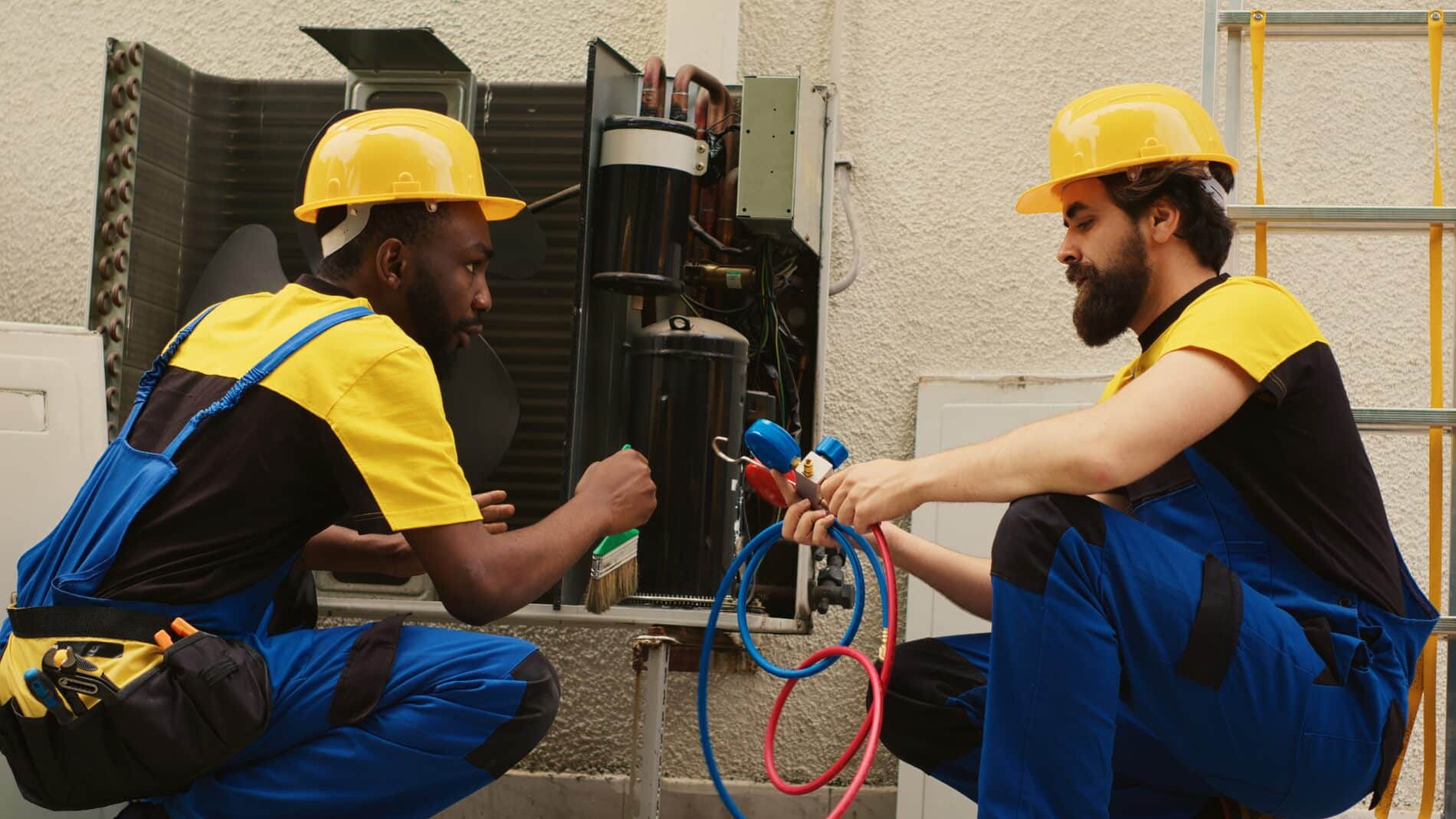Table of Contents
Toggle
Air Conditioning Replacement: Best 4 tips- AC Repair Garland
Four Indications It May Be Time for an Air Conditioning Replacement
Introduction
In the scorching heat of summer, a reliable air conditioning system becomes our best friend, providing a cool sanctuary from the rising temperatures. However, like all appliances, air conditioners have a lifespan, and there comes a time when a replacement becomes necessary. In this article, we will explore four key indications that signal it might be time to consider a new air conditioning system.
These indicators serve as valuable insights for individuals to assess the efficiency and functionality of their current cooling equipment. Whether it’s a decline in performance, increased energy consumption, frequent repairs, or outdated technology, recognizing these signs can guide homeowners toward the decision to invest in a new and more effective air conditioning replacement solution, ensuring optimal comfort during the sweltering summer months.
Signs of Inefficiency
One of the initial signs that your air conditioner is struggling is reflected in your energy bills. If you notice a sudden spike in energy costs without a significant change in usage patterns, your AC might be working inefficiently. Uneven cooling is another red flag and might be a sign of Air Conditioning Replacement. If certain areas in your home remain uncomfortably warm while others are overly cool, it’s a clear sign that your system is not operating at its best.
These indicators suggest that your air conditioning unit may require attention and maintenance to ensure optimal performance and energy efficiency throughout your living space.
Age of the System
Air conditioners, like any technology, have a finite lifespan, typically lasting around 10 to 15 years on average. As these systems age, their efficiency gradually decreases, resulting in higher energy consumption. If your air conditioner has faithfully served you for a decade or more, it may be approaching the end of its optimal performance years.
Considering the potential decline in efficiency, it might be worth assessing the condition of your AC unit and exploring options for replacement or maintenance to ensure continued effective cooling.
Frequent Repairs
Regular maintenance is a common aspect of system upkeep; however, if you consistently find yourself requesting repairs, it serves as a significant sign that your system may be nearing the end of its operational life. The cumulative expenses associated with frequent repairs can escalate rapidly, prompting the consideration that investing in a new and more dependable air conditioning system may prove to be a financially prudent decision.
Outdated Technology
Advancements in air conditioning technology occur regularly, with newer models boasting increased energy efficiency, environmental friendliness, and smart features. If your air conditioning system lacks these technological enhancements, considering an upgrade to a more modern unit can result in improved efficiency, reduced environmental impact, and enhanced overall comfort. Keeping pace with the latest developments in AC technology ensures a more sustainable and comfortable indoor environment for users.
Choosing the Right Air Conditioning Replacement
When contemplating an air conditioning replacement, selecting the appropriate system for your requirements becomes pivotal. Various factors, including the size of your home, the climate in your region, and your budget, should all be carefully considered.
It is advisable to seek professional advice and conduct a thorough assessment of your home’s cooling needs. This proactive approach will provide valuable guidance, enabling you to make an informed decision that aligns with your specific circumstances.
DIY vs Professional Installation
When considering the installation of a new system, individuals may choose between a do-it-yourself approach or opting for professional installation. While some may prefer the hands-on approach, it’s important to note that professional installation offers the advantage of a seamless transition.
Professionals possess the expertise required to handle complex installations, guaranteeing that your new system operates at its maximum potential right from the outset. Choosing professional installation ensures a smooth and efficient implementation, contributing to the overall effectiveness and performance of the system.
Budget Considerations
The cost of a new air conditioning replacement system can vary, and when considering the purchase, it is crucial to take into account not only the initial expense but also the potential long-term savings. While energy-efficient models may come with a higher upfront cost, they have the capacity to substantially decrease your monthly utility bills.
Choosing such models can be viewed as a wise investment, as the initial expenditure is offset by the ongoing savings in energy costs over time. In this way, the decision to invest in an energy-efficient air conditioning system reflects a thoughtful consideration of both short-term and long-term financial implications.
Manufacturer and Model Research
Before making a decision, it’s advisable to research different manufacturers and models. Recognized brands with positive customer reviews are likely to provide reliable and durable systems. Learning from others’ experiences can guide you in selecting a system that meets your expectations. Taking the time to gather information and consider user feedback can contribute to making a well-informed choice when it comes to choosing a product or system.
Preparing Your Home
Before the installation process begins, it is essential to make certain preparations. This includes clearing the installation area, ensuring proper ventilation, and addressing any structural issues that may exist. These preparatory steps are crucial in contributing to a smooth and successful replacement process. Taking the time to attend to these aspects beforehand can help facilitate the installation and ensure optimal conditions for the task at hand.
Benefits of a New System
Upgrading to a new air conditioning replacement system brings about numerous advantages. The improved energy efficiency of the new system not only contributes to reducing your environmental footprint but also results in long-term cost savings. In addition to these financial benefits, the upgrade provides enhanced comfort and air quality, creating a healthier and more enjoyable living environment overall.
Maintenance Tips for New Air Conditioning Replacement
To ensure the longevity of your new system, it is imperative to prioritize regular maintenance. This includes tasks such as changing filters, cleaning ducts, and scheduling professional check-ups. By adhering to these practices, you can effectively keep your air conditioner operating smoothly for years to come, promoting optimal performance and minimizing the risk of potential issues. Consistent and proactive maintenance not only enhances the lifespan of the system but also contributes to its overall efficiency and reliability.
Common Mistakes to Avoid
Throughout the air conditioning replacement process, it is crucial to be aware of common pitfalls. Learning from the experiences of others and proactively avoiding these mistakes can significantly save you time, money, and frustration in the long run. Taking a proactive approach to understanding potential challenges ensures a smoother and more successful replacement process.
Choose AC Repair Garland for Air Conditioning Replacement
In conclusion, recognizing the signs that it’s time for an air conditioning replacement is essential for maintaining a comfortable living space. Whether it’s inefficiency, age, frequent repairs, or outdated technology, taking proactive steps toward a new system ensures optimal cooling performance. It is crucial to consider the outlined factors, make a wise choice, and embrace the benefits of a modern, efficient air conditioning system for an improved and pleasant living environment.
FAQs
How often should I replace my air conditioning system?
The average lifespan is 10 to 15 years, but signs of inefficiency may prompt earlier air conditioning replacement.
Can I install a new AC system myself?
While possible, professional installation ensures optimal performance and avoids potential issues.
Are energy-efficient models worth the higher upfront cost?
Yes, they often lead to long-term savings through reduced energy consumption.
What should I look for in a reputable AC manufacturer?
Positive customer reviews, recognition in the industry, and warranty offerings are key indicators.
Is regular maintenance necessary for a new AC system?
Yes, regular maintenance is crucial for maximizing the lifespan and efficiency of your air conditioning system.

